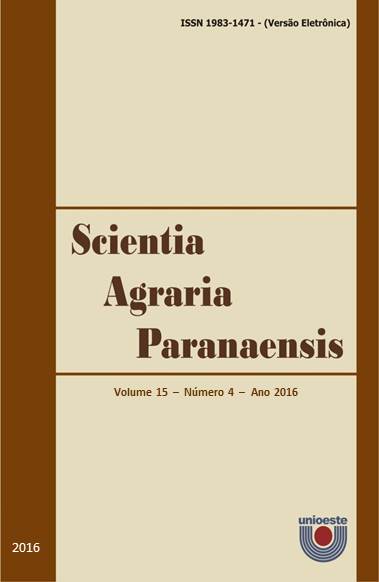Induction of resistance against damping off caused by Fusarium sp. in beet seedlings, by seed treatment with essential oil of Aloysia citriodora Palau
DOI:
https://doi.org/10.18188/sap.v15i4.13451Keywords:
Beta vulgaris L., fitopatologia, plantas medicinais, Verbenaceae.Abstract
This study aimed to evaluate the potential of essential oil of Aloysia citriodora in the induction of resistance in beet seedlings against damping off caused by Fusarium sp. The work was carried out by treating the seeds with concentrations (0.0625%; 0.125% and 0.25%) of essential oil of A. citriodora in distilled water plus surfactant Tween 80® (0.5%) and control treatment (distilled water plus surfactant Tween 80® 0.5%). The seeds after treated with essential oil were sown in substrate inoculated with Fusarium sp. It was evaluated after 14 days of sowning: the percentage of emergency at 4 and 14 days; the incidence of post-emergence damping off; green mass; the length of seedlings and biochemistry of plant tissues (total protein content, enzymatic activity of peroxidases, phenylalanine ammonia lyase, β-1.3-glucanases and chitinases). The results showed that the essential oil of this plant applied on seeds reduced the damping off caused by Fusarium sp. and induced biochemical plant defense mechanisms, by increasing the activity of peroxidases.Downloads
Published
07-12-2016
How to Cite
FREDDO, Álvaro R.; MAZARO, S. M.; BORIN, M. dos S. R.; BUSSO, C.; CECHIN, F. E.; ZORZZI, I. C.; DALACOSTA, N. L.; LEWANDOWSKI, A. Induction of resistance against damping off caused by Fusarium sp. in beet seedlings, by seed treatment with essential oil of Aloysia citriodora Palau. Scientia Agraria Paranaensis, [S. l.], v. 15, n. 4, p. 453–459, 2016. DOI: 10.18188/sap.v15i4.13451. Disponível em: https://e-revista.unioeste.br/index.php/scientiaagraria/article/view/13451. Acesso em: 19 sep. 2025.
Issue
Section
Scientific Article
License
Aviso de Direito Autoral Creative Commons
Política para Periódicos de Acesso Livre
Autores que publicam nesta revista concordam com os seguintes termos:
1. Autores mantém os direitos autorais e concedem à revista o direito de primeira publicação, com o trabalho simultaneamente licenciado sob a Licença Creative Commons Attribution que permite o compartilhamento do trabalho com reconhecimento da autoria e publicação inicial nesta revista.2. Autores têm autorização para assumir contratos adicionais separadamente, para distribuição não-exclusiva da versão do trabalho publicada nesta revista (ex.: publicar em repositório institucional ou como capítulo de livro), com reconhecimento de autoria e publicação inicial nesta revista.
3. Autores têm permissão e são estimulados a publicar e distribuir seu trabalho online (ex.: em repositórios institucionais ou na sua página pessoal) a qualquer ponto antes ou durante o processo editorial, já que isso pode gerar alterações produtivas, bem como aumentar o impacto e a citação do trabalho publicado (Veja O Efeito do Acesso Livre).
Licença Creative Commons
Esta obra está licenciada com uma Licença Creative Commons Atribuição-NãoComercial-CompartilhaIgual 4.0 Internacional, o que permite compartilhar, copiar, distribuir, exibir, reproduzir, a totalidade ou partes desde que não tenha objetivo comercial e sejam citados os autores e a fonte.


